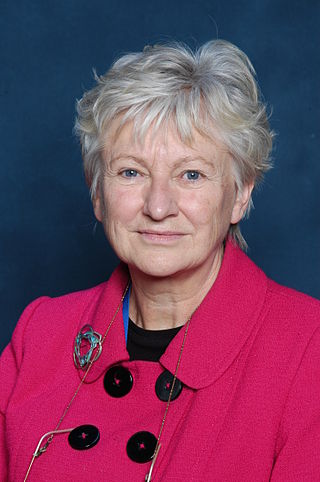
Family planning is the consideration of the number of children a person wishes to have, including the choice to have no children, and the age at which they wish to have them. Things that may play a role on family planning decisions include marital situation, career or work considerations, financial situations. If sexually active, family planning may involve the use of contraception and other techniques to control the timing of reproduction.

The Center for International Forestry Research (CIFOR) is a non-profit scientific research organization that conducts research on the use and management of forests with a focus on tropical forests in developing countries. CIFOR, which merged with World Agroforestry on Jan. 1, 2019, is the forestry and agroforestry research center of the Consultative Group on International Agricultural Research (CGIAR), a network of 15 research centers around the world that focus on agricultural research for sustainable development, working closely with governments and other partners to help develop evidence-based solutions to problems related to sustainable agriculture and natural resource management.
In economics, a cycle of poverty or poverty trap is caused by self-reinforcing mechanisms that cause poverty, once it exists, to persist unless there is outside intervention. It can persist across generations, and when applied to developing countries, is also known as a development trap.

Poverty reduction, poverty relief, or poverty alleviation, is a set of measures, both economic and humanitarian, that are intended to permanently lift people out of poverty.

Child poverty refers to the state of children living in poverty and applies to children from poor families and orphans being raised with limited or no state resources. UNICEF estimates that 356 million children live in extreme poverty. It's estimated that 1 billion children lack at least one essential necessity such as housing, regular food, or clean water. Children are more than twice as likely to live in poverty as adults and the poorest children are twice as likely to die before the age of 5 compared to their wealthier peers.

The International Food Policy Research Institute (IFPRI) is an international agricultural research center founded in 1975 to improve the understanding of national agricultural and food policies to promote the adoption of innovations in agricultural technology. Additionally, IFPRI was meant to shed more light on the role of agricultural and rural development in the broader development pathway of a country. The mission of IFPRI is to provide research-based policy solutions that sustainably reduce poverty and end hunger and malnutrition.
Children's culture includes children's cultural artifacts, children's media and literature, and the myths and discourses spun around the notion of childhood. Children's culture has been studied within academia in cultural studies, media studies, and literature departments. The interdisciplinary focus of childhood studies could also be considered in the paradigm of social theory concerning the study of children's culture.
The first Social Audit was carried out in Sweden (1985–88) by John Fry and Ulla Ressner, worklife researchers at the Centre for Swedish Working Life (Arbetslivscentrum) and published in Sweden in 1988 by Allmäna Förlaget, Stockholm under the title "Social Revision av ett Ämbetsverk". It was the result of a three-year study of Sweden's central bureaucracy - The National Labour Market Board (Arbetsförmedlingen). The study was based on interviews and questionnaires with over 1,000 employees at all levels of the organisation throughout the country and became the subject of debate in the Swedish Riksdag (Parliament). Its focus was to assess the correspondence between the work experiences of employees and management on the one hand, and the legislated and collectively agreed upon objectives for service, work environmental and managerial policies in its established definition of effectivity in the workplace. In short, it was an assessment of the institutionalisation of a Democratic Rationality.
Professor Wei-Jun Jean Yeung is a Taiwanese sociologist and demographer, now is the professor of Asia Research Institute, National University of Singapore. She chairs the Family, Children, and Youth Research Cluster in the Faculty of Arts and Social Sciences in NUS.
Birth cohort studies in Britain include four long-term medical and social studies, carried out over the lives of a group of participants, from birth. Two of these studies have continued for over 50 years.
Dr. Aldas Janaiah is an Indian senior scientist and economist who did extensive research on socio-economic and policy issues related to technological developments, adoption and its impacts in South Asia and SE Asia.
Integrated Child Development Services (ICDS) is a government program in India which provides nutritional meals, preschool education, primary healthcare, immunization, health check-up and referral services to children under 6 years of age and their mothers. The scheme was launched in 1975, discontinued in 1978 by the government of Morarji Desai, and then relaunched by the Tenth Five Year Plan.

Shoaib Sultan Khan NI is one of the pioneers of rural development programmes in Pakistan. As a CSP Officer, he worked with the Government of Pakistan for 25 years, later on he served Geneva based Aga Khan Foundation for 12 years, then UNICEF and UNDP for 14 years. Since his retirement, he has been involved with the Rural Support Programmes (RSPs) of Pakistan full-time, on voluntary basis. Today, the Rural Support Programmes have helped form 297,000 community organisations in 110 districts including two Federally Administered Tribal Areas of Pakistan.
The Centre for Economic and Social Studies (CESS) is an Indian autonomous research institute, established in 1980 to facilitate research activity in Economics and Social Sciences. It was a brain child of B.P.R. Vithal, IAS (Retd)., a former Principal Secretary to Government of Andhra Pradesh, Finance and Planning Department. The campus is situated at Begumpet, in Hyderabad.

Angela W. Little is Professor Emerita at the Institute of Education, University of London. She is known for her work in primary education policy and practice in developing countries as well as education planning, program evaluation and assessment. In particular she has focussed in seven main areas:
Disability and Development Partners (DDP) is a UK charitable company limited by guarantee that works with local partners in South Asia and Africa. "DDP works in a holistic way, recognizing the correlation between poverty and disability and the importance of tackling social, economic and human rights issues through access to income generation and education opportunities as well as providing physical rehabilitation services."
Santosh Mehrotra is a development economist, whose research and writings have had most influence in the areas of labour, employment, skill development, on the relationship between human development and economic growth, child poverty, and the economics of education. He was an economic adviser in the United Nations system in New York City, Italy, and Thailand (1991–2006), and technocrat in the government of India (2006–2014), apart from making contributions to academic research since the mid-1980s. He has also in recent years established a reputation as an institution-builder in the field of research in India, despite facing difficult odds. He brings a combination of professional experience: with the Indian government as a policy maker and adviser, with international organisations as a technical expert, having lived on three continents and travelled to 63 countries providing technical advice to governments; and as an academic whose research work has been translated into French, Spanish, Portuguese, Italian and German.
Curricula in early childhood care and education (ECCE) or early childhood curriculum address the role and importance of curricula in the education of young children, and is the driving force behind any ECCE programme. It is ‘an integral part of the engine that, together with the energy and motivation of staff, provides the momentum that makes programmes live’. It follows therefore that the quality of a programme is greatly influenced by the quality of its curriculum. In early childhood, these may be programmes for children or parents, including health and nutrition interventions and prenatal programmes, as well as centre-based programmes for children.





